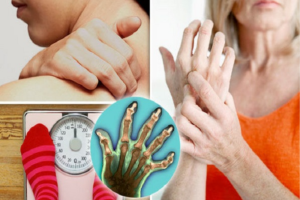Introduction In a world where misinformation spreads like wildfire, it’s crucial to separate fact from fiction, especially when it comes to health-related topics like arthritis. Despite being a common condition affecting millions worldwide, arthritis is often surrounded by myths and misconceptions that can lead to unnecessary fear and confusion. In this comprehensive guide, we’ll debunk
Introduction
In a world where misinformation spreads like wildfire, it’s crucial to separate fact from fiction, especially when it comes to health-related topics like arthritis. Despite being a common condition affecting millions worldwide, arthritis is often surrounded by myths and misconceptions that can lead to unnecessary fear and confusion. In this comprehensive guide, we’ll debunk some of the most prevalent myths surrounding arthritis, providing you with accurate information to help you navigate this condition with confidence.
Myth #1: Arthritis Only Affects the Elderly
One of the most widespread misconceptions about arthritis is that it only impacts older individuals. While it’s true that age is a risk factor for developing certain types of arthritis, such as osteoarthritis, this condition can affect people of all ages, including children and young adults. In fact, there are over 100 different types of arthritis, each with its own unique causes and risk factors. Rheumatoid arthritis, for example, is an autoimmune disorder that can develop at any age, often striking individuals in their prime years.
Myth #2: Arthritis is Just a Normal Sign of Aging
While it’s common for joint pain and stiffness to increase with age, arthritis is not simply a natural consequence of getting older. While age can be a contributing factor to the development of arthritis, it is not the sole determinant. Many factors, including genetics, lifestyle choices, and underlying medical conditions, can influence your risk of developing arthritis. By maintaining a healthy lifestyle, including regular exercise and a balanced diet, you can help reduce your risk of developing arthritis as you age.

Image by: yendex.com
Myth #3: Exercise Worsens Arthritis Symptoms
Contrary to popular belief, exercise is actually beneficial for individuals with arthritis. Regular physical activity can help improve joint flexibility, strengthen muscles, and reduce pain and stiffness. Low-impact exercises such as swimming, cycling, and yoga are particularly effective for people with arthritis, as they provide the benefits of exercise without putting undue stress on the joints. It’s essential to consult with a healthcare professional or physical therapist to develop an exercise regimen that is safe and appropriate for your individual needs.
Myth #4: There’s Nothing You Can Do to Prevent Arthritis
While you can’t always prevent arthritis from developing, there are steps you can take to reduce your risk and manage your symptoms effectively. Maintaining a healthy weight, avoiding smoking, protecting your joints from injury, and staying physically active are all essential strategies for preventing arthritis and minimizing its impact on your life. Additionally, early diagnosis and treatment can help slow the progression of arthritis and improve your quality of life.
Myth #5: All Joint Pain is Arthritis
While joint pain is a common symptom of arthritis, it’s not the only possible cause. Many other conditions, such as bursitis, tendinitis, and fibromyalgia, can cause similar symptoms to arthritis. It’s essential to consult with a healthcare professional for an accurate diagnosis if you’re experiencing joint pain or stiffness. A thorough evaluation, including medical history, physical examination, and diagnostic tests such as X-rays or blood tests, can help determine the underlying cause of your symptoms and guide appropriate treatment.

Image by: yendex.com
Myth #6: Arthritis is Untreatable
While there is currently no cure for arthritis, many effective treatments are available to help manage symptoms and improve quality of life. Medications, such as nonsteroidal anti-inflammatory drugs (NSAIDs), corticosteroids, and disease-modifying antirheumatic drugs (DMARDs), can help reduce pain and inflammation and slow the progression of the disease. In addition to medication, other treatments such as physical therapy, occupational therapy, and lifestyle modifications can also be beneficial in managing arthritis symptoms. Explore More About (Ringworm Infections)
Myth #7: Weather Doesn’t Affect Arthritis Symptoms
Many people with arthritis report that changes in weather, particularly cold and damp conditions, can exacerbate their symptoms. While scientific evidence on the relationship between weather and arthritis symptoms is mixed, many individuals report experiencing increased pain and stiffness during certain weather patterns. If you find that weather changes impact your arthritis symptoms, you may benefit from taking steps to mitigate their effects, such as staying warm, staying active, and using heat or cold therapy as needed.

Image by: yendex.com
Myth #8: Arthritis Only Affects the Joints
While arthritis is primarily characterized by inflammation of the joints, it can also affect other parts of the body, including organs such as the heart, lungs, and skin. In some cases, arthritis can lead to complications such as cardiovascular disease, respiratory problems, and skin rashes. It’s essential for individuals with arthritis to receive comprehensive medical care to monitor and manage any potential complications associated with their condition.
Conclusion
Arthritis is a complex and often misunderstood condition that affects millions of people worldwide. By dispelling common myths and misconceptions surrounding arthritis, we can empower individuals to better understand and manage their condition. By adopting a holistic approach to treatment that includes medication, exercise, lifestyle modifications, and regular medical care, individuals with arthritis can lead active and fulfilling lives. Remember, knowledge is power, and by staying informed about arthritis, you can take control of your health and well-being.




















